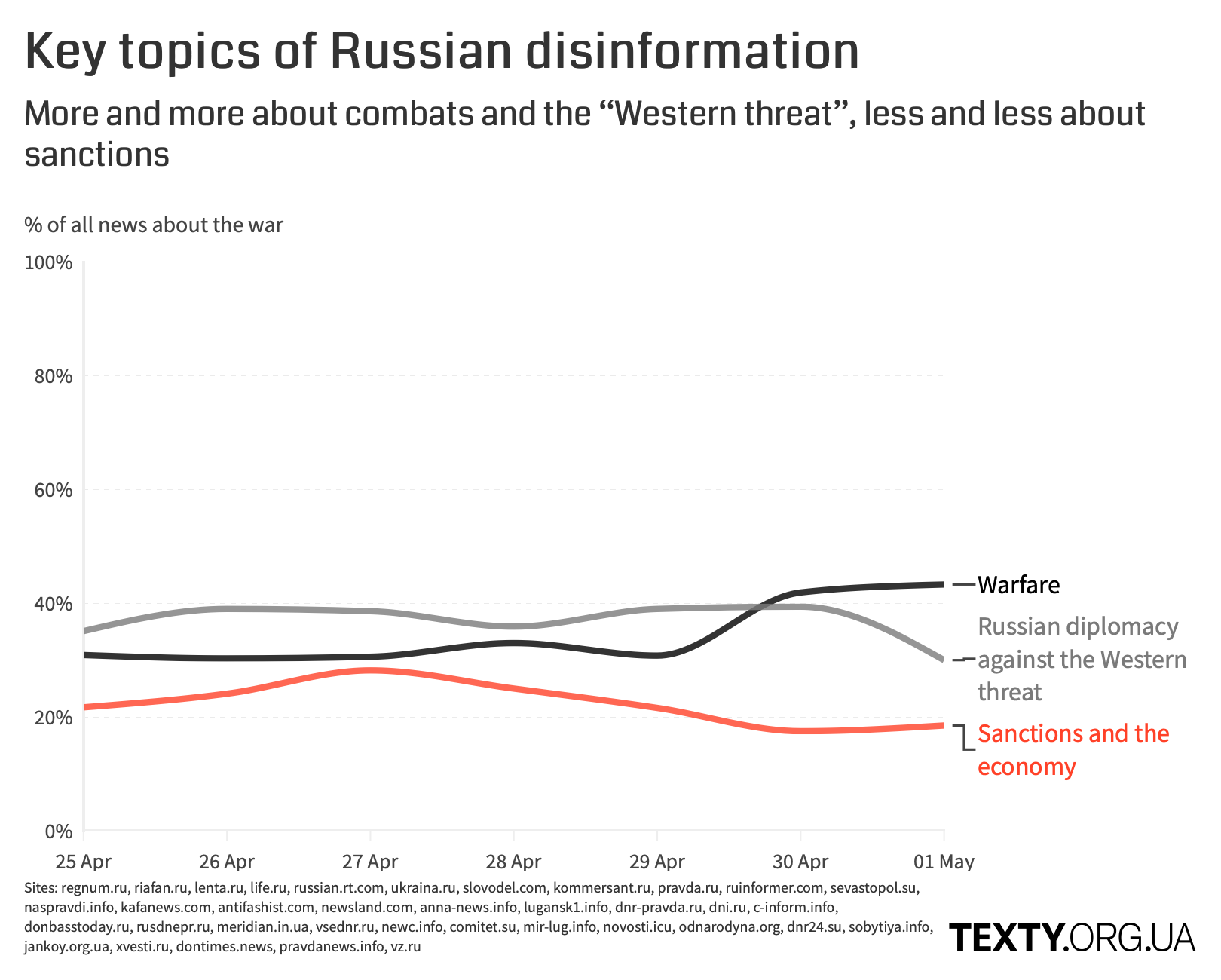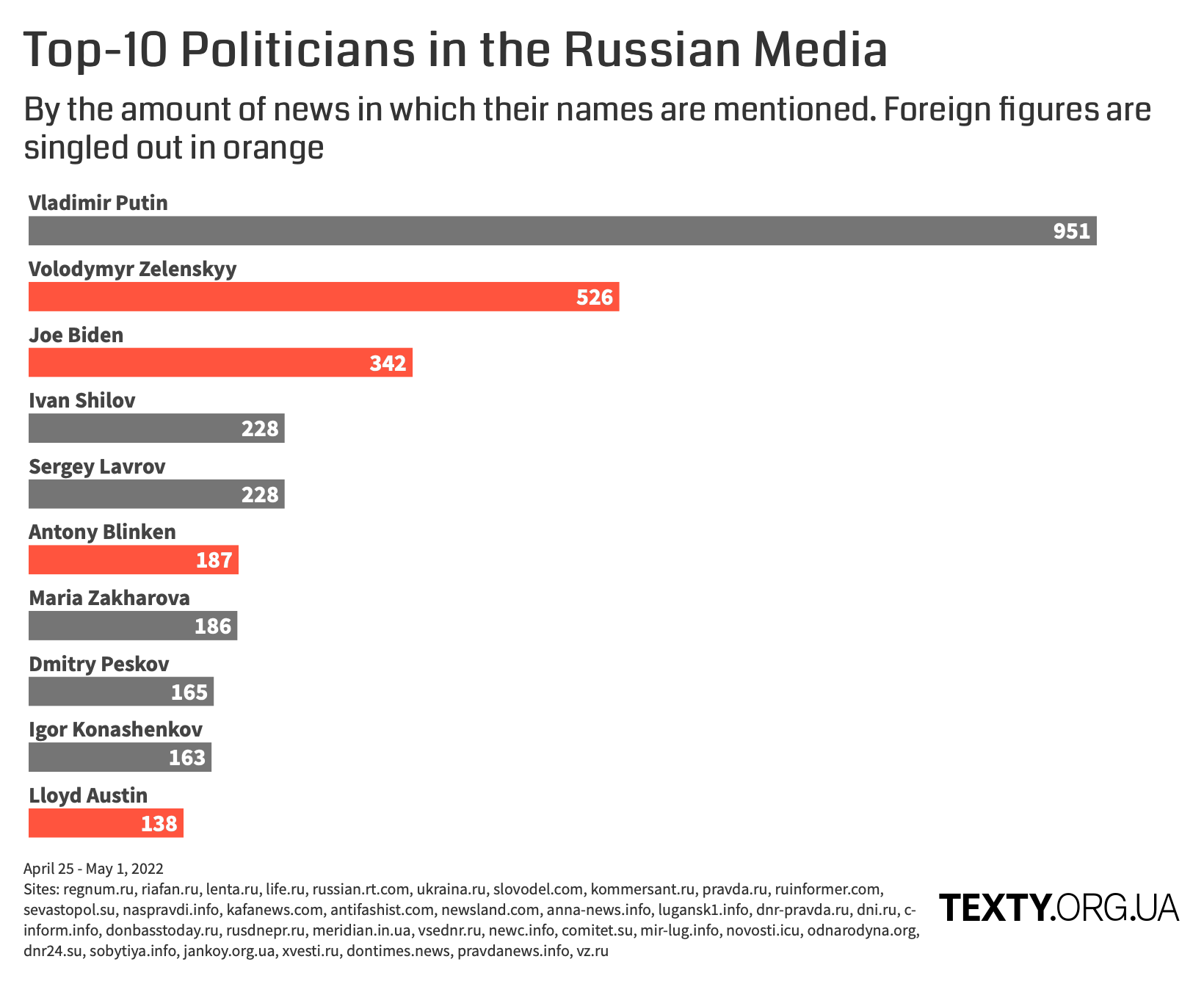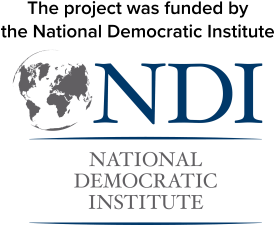Russia’s Struggle with the US, Against Sanctions and for a Bright Future for the Whole World. Russian Media Monitoring for April 25th - May 1st
Russian disinformers continue to cover every third item of news about the war in Ukraine and its consequences for Russia. And we continue to analyze the news of Russian websites and review what the enemy is telling its own population about the attack against Ukraine. To do this, we analyzed more than 21 thousand pieces of news from the Russian state media and manipulative websites that are targeted to spread Russian disinformation.

The USA is a threat on a planetary scale
Sometimes it seems that the word “USA” is mentioned more often in Russian news feeds than the word “Russia”.
The USA is the main target of Russian anger, as “Washington and its allies have moved from helping Ukraine protect itself to a policy of undermining Russia’s power and influence.” Disinformers continue supporting the points that Ukraine, with the help of the United States, could have become a threat to Russia, and that «the American authorities have never followed the principle of “peaceful coexistence”, so the USA is a threat to the planet.» The extent of the use of the United States as Russia’s main enemy is evidenced by Biden’s inclusion in the top-3 most mentioned in the Russian media. In our rating, he is exceeded by Putin and Zelenskyy only.

Russian news is actively spreading messages about Washington’s interest in the war in Ukraine in order to “divert the attention of the population from its own failures in public management and the growing lump of political and socio-economic problems in the United States.” Russians are worried about the economic situation in the USA and accompany the reports of the land-lease for Ukraine with points about the problems in the US economy: “This news arrived as in the first quarter of 2022 US GDP fell by 1.4%. In addition, the country has serious problems with rising fuel prices.” Recently, Russian Foreign Ministry representative Maria Zakharova exaggerated staffing problems in the US president’s office and said that “the team of US President Joe Biden’s administration is fleeing the White House… along with the lack of trust in the administration and Biden personally.”
It was the US influence that the Russians linked Poland’s plans to seize the western regions of Ukraine: «the ideal option for Poland to enter the territory of Ukraine would be to send troops “to help”, deploy them in five regions, and then, when everything collapses, make claims to these lands.»
Russian propagandists have even managed to drag in the USA to the mentions of the 1986 Chornobyl nuclear power plant disaster: “In 1986, the nuclear power industry of the USSR suffered huge reputational losses in the international market. And in this sense, Chornobyl continues to carry out its poisonous activities: it is enough to recall at least the recent sensational American TV series under this name, which is completely deceitful. …So the classic question of criminologists about who benefited from the Chornobyl disaster is not open, the answer to it is obvious.”
Altogether the United States in Russian news is still shown as a demonic superior of the “collective West”, which “intended to destabilize the military-political situation around Russia and for that created hotspots of tension in its neighboring states.” By this logic, the West “wants to provoke Russia into declaring a full-fledged war on Ukraine”, and with its support “only delays the military special operation, and does not help.”
The Russians see themselves as a bright force capable of resisting the dark plans of the USA and the West to create a “global NATO as a mechanism for governing the world.”
Fantasies about Transnistria
When the Russian media write about the war, they still focus on Donbass and Mariupol, and very vaguely mention the course of hostilities in other parts of Ukraine. In general, they are trying to create an informational picture in which the main actors are the “armies” and “people’s militia” of the “republics”, and the Russian armed forces and “volunteers” only help them carry out a “special operation” to “denationalize” Ukraine and “protect the population” from the “Ukrainian Nazis.”
Russian military “experts” and “analysts” continue to dream of defeating the Ukrainian army. “Russia, in fact, controls the territory of Ukraine, Kyiv can do nothing about it,” “In a month Russia will arrange in Donbass three full-fledged pockets for the Armed Forces of Ukraine,” - they say. Then the Russians dream of moving on to Transnistria.
The topic of the Russian exclave in Moldova has often emerged in the Russian propaganda and disinformation media. “Romanian troops in the uniform of Moldovan military are already in Moldova,” “... we will have to make efforts to unblock Transnistria,” Russian military commentators said.
Of course, behind the scenes of the recent events in Transnistria are allegedly the United States, which is longing for Moldova.
Demonization of Ukrainian refugees
We have also recorded a number of similar publications promoting the narrative of “bad Ukrainian refugees in Europe”:
“The impudent behavior of Ukrainian refugees is encountered not only in Lithuania, but also in Italy. According to expert Mark Bernardini, the Europeans were mistaken, counting on gratitude from the Ukrainians.”
The Russians are dehumanizing Ukrainian refugees, calling them “militants” and threatening Europe with growing “ethnic crime” and “prostitution.” Such points sound from the mouths of high-ranking Russian officials.
Fantasies about the new system of the world economy and the “back-and-forth economy” from the 1990s
News of sanctions is presented carefully so as not to report about anything sad. Their influence is described as a temporary annoyance that will soon be overcome.
They write that sanctions do not achieve their goal (“Russia successfully copes with sanctions”), and restrictions harm primarily Ukraine’s allies.
The Russian media is trying to encourage Russians with news about the weakness of the European economy: «expected long-term inflation in the EU could “kill the euro”».
Every decision of Putin gets a halo of genius and praise. His decree on the payment for energy resources in rubles, which is presented as the acquisition of financial sovereignty and the creation of a new global financial system, was no exception.
Blackmail by disconnecting EU from Russian energy sources inspires journalists to report that Europeans “out of desperation, will agree to pay Moscow for gas in rubles”, “the EU energy market is also on the brink and will soon be plunged into shock. If Brussels fails to resolve the issue of payment in rubles, as Moscow demands, most of the countries will be left without raw materials for the economy.”
The essence of these narratives is that the Russians should wait and the Europeans will come back to the pre-war level of business with Russia “to prevent the gas crisis.”
However, it is obvious that sanctions are beginning to gain momentum and put pressure on the country’s economy. More often there are news that companies that have left Russia either will be bound to pay compensations to Russians, because according to media reports, “courts are now inclined to take the side of consumers in disputes with companies that have left Russia”, “non-fulfilment of the guarantee threatens car distributors and importers bankrupt”, or their place will be taken by domestic producers. For example, a Russian businessman has already decided to “develop his store, similar to IKEA, but under his own brand”, and “the head of Buryatia Alexey Tsydenov said that after IKEA leaves the Russian market, the republic can significantly increase furniture production.” Such stories are just a blind and an attempt to create a picture of a bright and independent future from other countries.
Closer to the truth is the message about the return of the experience of the 1990s - to the “back-and-forth business”. Dmitry Medvedev has already stated: “Russia has not done this before, respecting the interests of foreign brands in our country, but since they did this to us, may them not be offended.” The media write about “parallel import. This is when you can buy whatever you want, but bypassing official distributors”, which actually means legalized smuggling.
“Unpatriotic” celebrities
Aggressive rhetoric against anti-war statements by representatives of Russian culture is actively spreading. Russian media harass Maxim Galkin, who is “just ashamed to be a patriot” and “gay, and his marriage to singer Alla Pugacheva is fictitious,” musician Andrey Makarevich, who “repeatedly insulted Russians,” and Chulpan Khamatova, who “needs to be brought down a peg.” In response to the anti-war position, one of the State Duma deputies «proposed to draft a law that would block the return of “traitors” to Russia».


